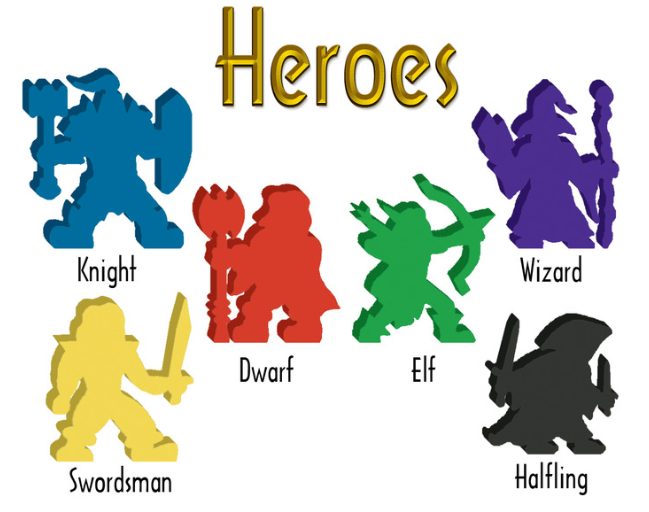Human cloning experiments have succeeded (though not exactly legally), and various factions are trying to gain influence over the clones. In the Orphan Black card game, you’ll work to achieve your agendas, while trying to keep your true colors hidden.
At a glance: Orphan Black is for 3 to 6 players, ages 12 and up, and takes about half an hour to play. It was designed by Jay Cormier and Sen-Foong Lim (the Bamboozle Brothers) and published by IDW Games. It retails for $29.99. Note: while the TV series the game is based on is definitely not for kids, the card game is tame enough for kids (though they won’t understand specifics).
Spoiler Alert: You can play the game without having seen the series, but the game does include some minor spoilers for those who haven’t seen the show, so be warned. I will try to keep this review mostly spoiler-free—in fact, I ended up watching the first three seasons of the show after playing the game once before I got too familiar with the cards and the characters on them. I would say that if you’ve seen the first two seasons, none of the cards will be spoilers.
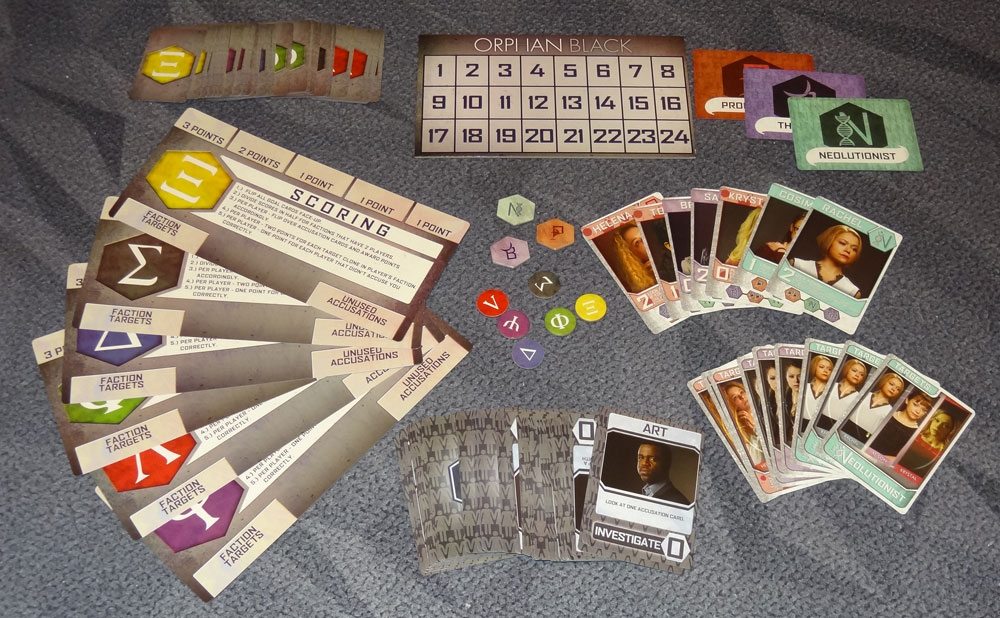
Components
- Scoreboard
- 3 Faction Score tokens
- 6 Player Score tokens
- 36 Accusation cards (6 per player)
- 6 Player mats
- 3 Faction cards
- 9 Goal cards
- 9 Clone cards
- 52 Influence cards (16 characters, 36 numbered cards)
The components are of decent quality but nothing spectacular: the Accusation cards are mini-sized cards, and the rest are standard-sized cards. The scoreboard and tokens are cardboard, but the player mats are just large cardstock. The cards feature photos of the people from the show, but there’s not much in the way of flavor text. Each of the three factions has a logo, but the logos are game-specific and not taken from the show; personally, I think the logos aren’t extremely well done. The cards are also all easy to read but not particularly exciting.

How to Play
The goal of the game is to score the most points by swaying clones to your faction and deducing the factions of your opponents.
To set up, place the faction cards in the center of the table forming a triangle (going clockwise: Prolethean, Neolutionist, The Black). Shuffle the Influence cards (the numbers and the characters) and deal each player 3 cards. Place the scoreboard and Faction Score tokens nearby. Each player gets a Player mat, the matching Accusation cards, and Player Score token. Separate the Goal Cards by faction, shuffle each faction separately, and then discard one from each faction at random without looking. Then shuffle these together and deal one to each player face-down.
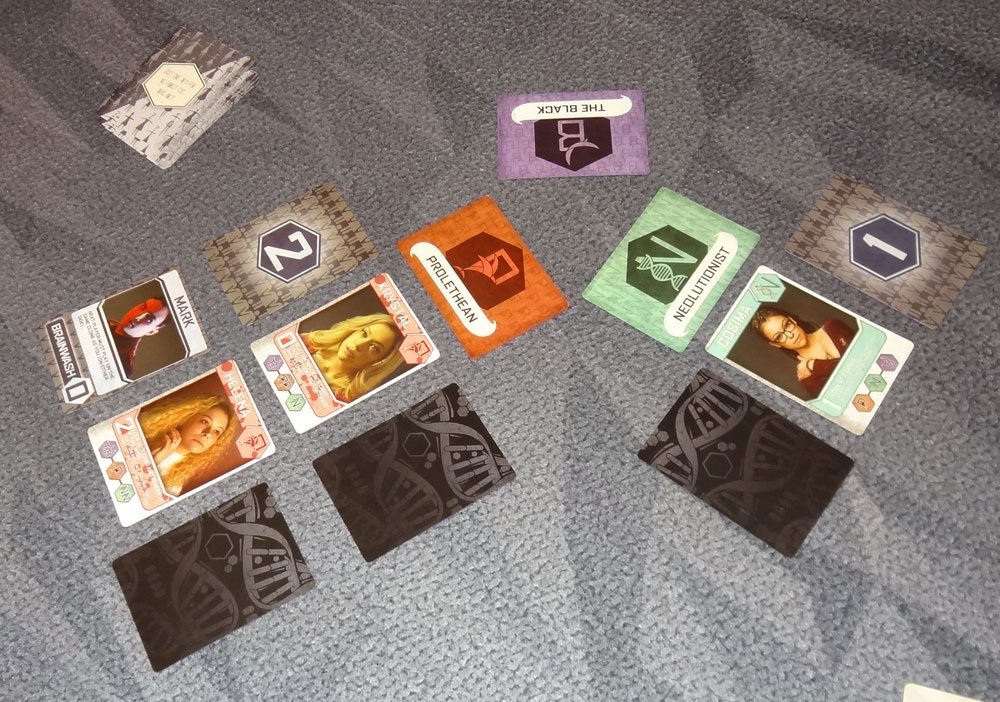
Finally, set up the starting clones: each player in turn order will draw 1 Clone card, place it in the starting faction (indicated on the card). Then, the player will draw two Influence cards, and place one on each side of the clone, one face-up and one face-down.
On your turn, you do the following in this order:
- Optional: Play a character card.
- Play an Influence card.
- Resolve and score.
- Optional: Make accusations.
- Draw back up to 3 cards.

Play a Character card
If you play a character, simply reveal it, do what it says, and then discard it unless it says otherwise. This step is optional.
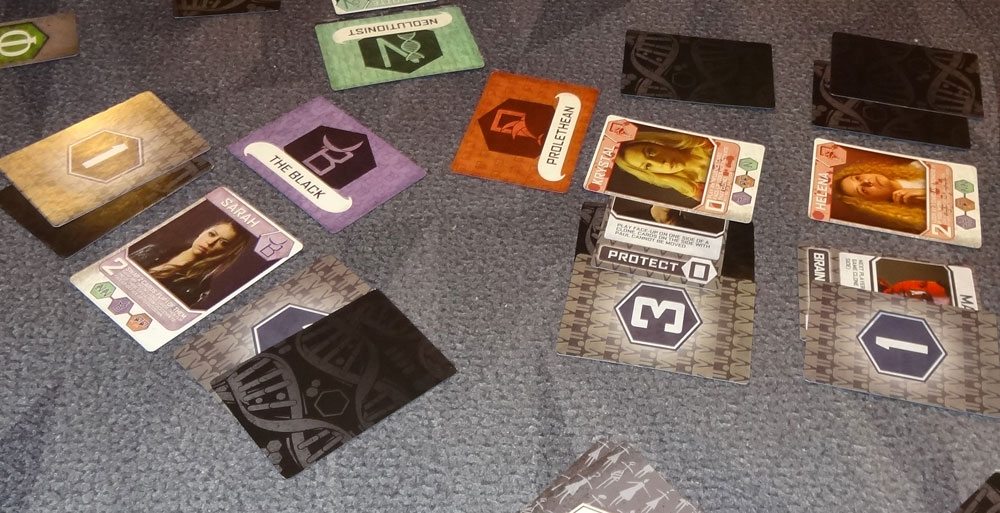
Play an Influence card
Play a card face-down on either side of a Clone card face-down. Character cards may be played but have 0 influence (and do not trigger the character’s ability). After playing the Influence card, activate the clone’s ability. (If any character cards are revealed through this ability, they are not triggered.)

Resolve and score
If any clones have at least 6 Influence cards next to them, they are resolved and scored. Reveal all of the Influence cards next to a clone (after shuffling each side individually), and add up the total influence on each side. Each clone has a threshold for being moved. If the difference between the two influence totals is greater than the threshold, then the clone has been swayed and will move left or right to the winning faction; otherwise, the clone was not swayed and remains in her starting faction. Look at the scoring symbols at the bottom of the card, and move the Faction Score marker on the scoreboard for the winning faction. Then tuck the Clone card face-down underneath the appropriate Faction card.
You’ll note that the threshold for clones is between 0 and 2—the lower the threshold, the easier it is to sway a clone to a different faction. Clones with higher thresholds are worth more points if you manage to sway them, and clones with low thresholds are worth more points to the original faction if they manage to keep them.
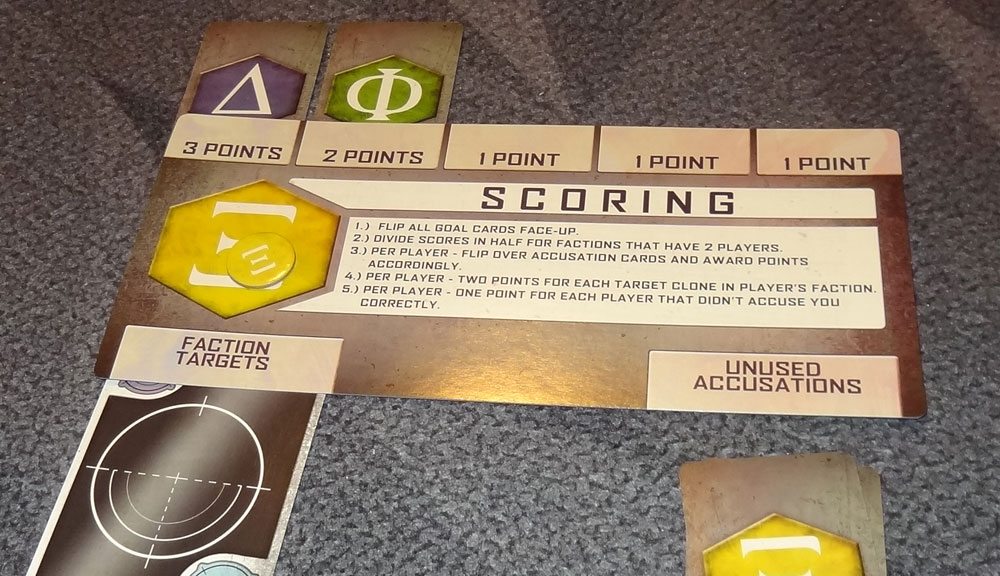
Make accusations
You may make as many accusations as you want on a turn: take your Accusation cards, pick one that corresponds to the faction you think another player belongs to, and play it (face-down) on their player mat. You have two Accusation cards per faction; the earlier you guess, the more points you will get if you are correct.
Draw cards
Draw Influence cards until you have 3 in your hand.
The game ends when all of the clones have been resolved and scored. Once the final clone has been scored, any remaining Accusation cards may not be played.
At the end, everyone reveals their Goal cards: if there were two people in the same faction, halve that faction’s score (rounded up) and move the scoring marker down accordingly. Then, put your own scoring marker on the same space as your faction’s marker: this is your starting score, and then you will also score points for yourself.
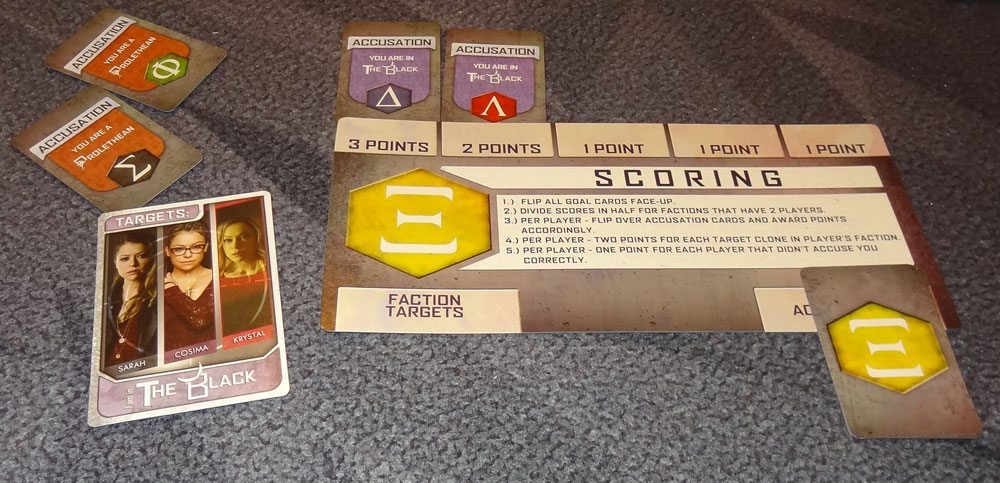
Next, reveal the Accusation cards in front of you. Remove any that were incorrect, and then slide all remaining cards to the left, keeping them in order. Each player who was correct then scores points according to the mat: 3 points for the first correct player, 2 points for the next player, and so on.
Then, flip over the Clone cards under each Faction card to reveal them, and compare these to your Goal card. You get 2 points for each of your three target clones that ended up in your faction.
Finally, score 1 point for each player that did not accuse you correctly, whether because they guessed the wrong faction or did not guess at all before the game ended.
Highest score wins; ties go to the player who got the most of their target clones.
The Verdict
I don’t want to show too many other photos of the game, because there are some characters that appear as surprises in the show and I had to crop some of them out in these photos. In general, I would say that you can play the game and it won’t spoil specific plot points, but there are a couple hints of things. Since there isn’t flavor text on the cards, a lot of it is left fairly ambiguous: for instance, the non-clone characters don’t belong to a particular faction within the game, even though in the show they might have a particular slant. So, in terms of theme, I think the game doesn’t rely too heavily on the theme—good for not spoiling the show, but perhaps not as good if you were expecting the game to immerse you in the world of Orphan Black.
The gameplay mostly focuses on using character abilities and clone abilities to manipulate influence, moving clones into your faction, particularly your secret target clones. But you can’t be too obvious about it: there are a lot of points to be had by guessing somebody’s faction, and by keeping your own faction a secret. Before a clone is scored, the cards on each side are shuffled up so that you don’t know for sure who played what. However, there are abilities that can flip a card face-up, so if somebody uses one of those right after you played a card, they may be able to get an idea of which faction you’re rooting for. Also, when you put a new clone into play, you have to put two influence cards on it, and one is played face-up. That can be a tough decision, deciding which one to reveal and which to keep hidden.
Usually, though, there’s always a little uncertainty even if you know which card somebody played, because there’s a chance they belong to the clone’s starting faction and are just trying to balance out the two sides so the clone doesn’t move. That uncertainty may be the best thematic tie-in to the show, though, because when you watch the show you’re constantly learning things about each character’s motivations and intentions, and there are a lot of shifting allegiances throughout.
Overall, the Orphan Black Card Game is an interesting game that has a bit of a social deduction aspect to it, though it is more card-driven and structured than something like Werewolf or even The Resistance. There can be a bit of table talk throughout the game, but even if you know somebody is in the same faction, you’re still competing against them, so you don’t want to share information even with them. (I suppose that mutual distrust is also a good theme for the show.) The gameplay itself is fairly simple—the complex part is tracking all of the hidden information and using that to your own benefit.
If you love the show, you may get a kick out of taking on the role of one of the factions and manipulating these characters, though you may also lament the missed opportunities to throw in some more flavor text and thematic elements. If you haven’t watched the show, you may still enjoy the game just as a game of influence and deduction, though the theme would be lost on you. Orphan Black is available now online and in stores.
Disclosure: I received a review copy of this game.


